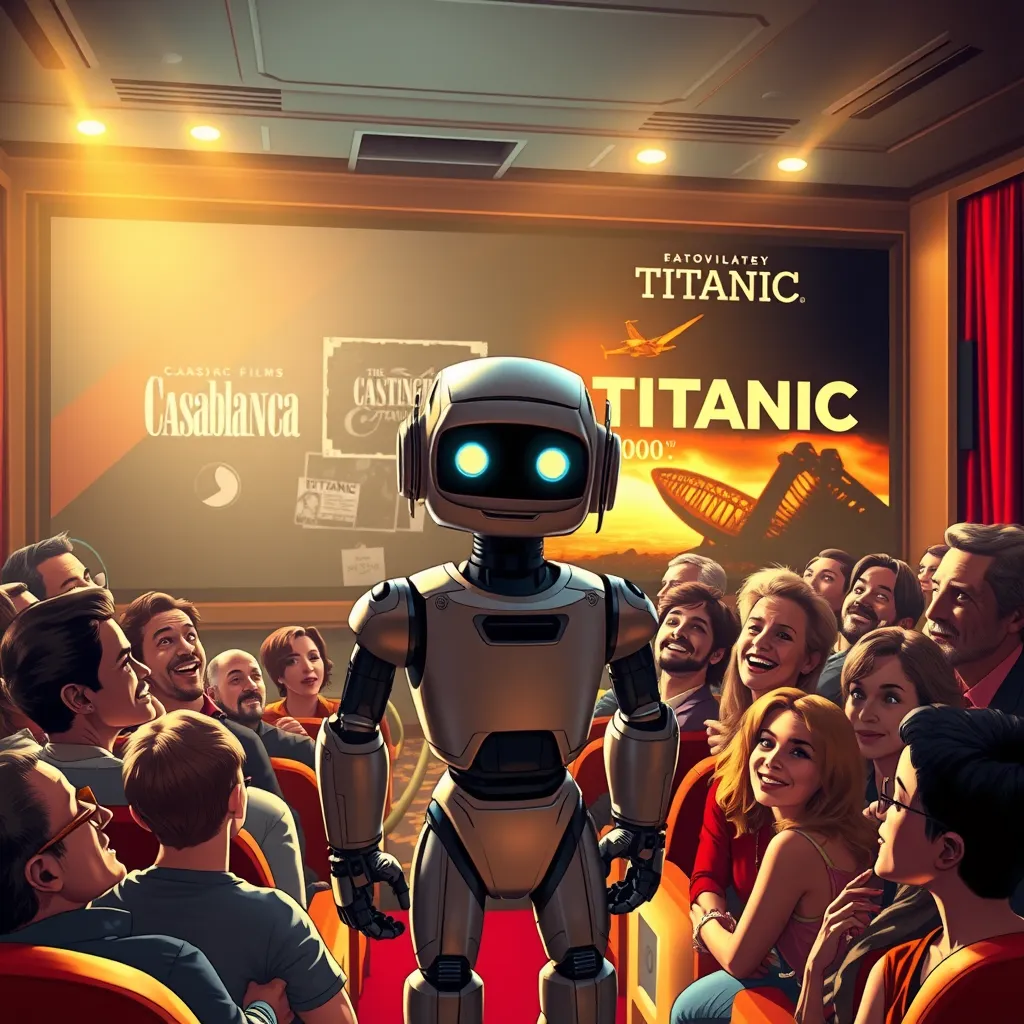The AI Takeover of Cinema: Are Robots the New Critics?
London, England - In an unprecedented move that has shocked the film industry and delighted tech enthusiasts, several entertainment giants have agreed to allow an AI model to train using their extensive film and TV archives. This decision not only raises eyebrows but also prompts the question: are we ready for a future where our movie critics are algorithms programmed to analyze every frame and plot twist with laser precision?
Lights, Camera, Algorithm!
Imagine this: you sit down to watch a classic film, perhaps Casablanca or Titanic, and instead of a human critic dissecting every nuance of the story, you have a charmingly sarcastic AI named “CriticBot 3000” delivering its analysis.
CriticBot 3000, with its meticulously trained database of film history, can spout off facts like, “Did you know that the iconic scene in Titanic where Jack sketches Rose was shot in a freezing cold room, and Leonardo DiCaprio had to wear a wetsuit under his clothes?” But the real kicker? It delivers this information in a voice reminiscent of Morgan Freeman, making even the most mundane details sound profound.
The Good, The Bad, and The Ugly of AI Critics
While the idea of AI critics sounds amusing and futuristic, it also brings forth a slew of concerns. Fans argue that nothing can replace the human touch in film criticism. After all, how can an AI understand the emotional weight of a dramatic scene or the subtle nuances of human relationships?
“I just don’t think a robot can appreciate the gut-wrenching heartbreak of a film like Eternal Sunshine of the Spotless Mind,” says Jessica Moore, a devoted film buff. “What’s next? Are we going to let them write the scripts too?”
Fear not, Jessica! AI may be good at analyzing plots, but it struggles with creativity. Imagine a world where AI writes the next blockbuster: “The Fast and the Furious 27: The Revenge of the Electric Cars.” No thanks!
Fan Reactions: From Skepticism to Hilarity
As news of AI film critics spread, fans took to social media, expressing a mix of skepticism and humor. Memes flooded the internet, showing AI bots watching films with captions like, “This popcorn is 99% optimized for consumption efficiency!” and “Error 404: Emotional Response Not Found.”
One particularly hilarious tweet featured a screenshot of CriticBot 3000, with the caption: “Just finished watching The Notebook. It appears humans cry when someone says ‘I love you’ for the tenth time. Fascinating!”
The Future of Film Criticism
But is there a place for AI in the film industry? Many believe that while AI can assist in providing data-driven analysis, the nuanced discussions surrounding film will always require a human touch.
“AI can tell you that a film has a 98% rating on Rotten Tomatoes, but it can’t explain why that’s important or how it made you feel,” says Oliver Smith, a film studies professor at the University of London. “It’s a tool, but not a replacement.”
Cross-Border Cinema: A New Frontier
While we’re on the topic of cinematic innovations, let’s not forget the current state of global tensions, which has led to a rise in cross-border cinema collaborations. As escalating hostilities have heightened fears of conflict, filmmakers are stepping up to unite audiences through art.
Directors from across the globe are teaming up to create films that bridge cultural gaps and promote understanding. Imagine a rom-com about a British gentleman falling in love with a French woman while dodging geopolitical tensions. Talk about a plot twist!
The Potential for Laughs Amidst Chaos
In the midst of a world filled with uncertainties, comedy and absurdity have become vital elements in storytelling. Films like Everything Everywhere All at Once have proven that unconventional narratives can resonate with audiences while making them laugh and cry simultaneously. As AI learns to analyze humor, will we soon have robots writing the next great comedy?
“If AI can write a decent joke, I might just throw my hands up and concede defeat,” jokes comedian Sarah Collins. “But until then, I’ll keep my day job!”
Conclusion: A Humorous Intersection of Technology and Art
As we embark on this journey into a future where AI learns from our cinematic past, we’re left with a delightful mix of excitement and skepticism. Will CriticBot 3000 become our new favorite film buddy, or will it crash and burn like a poorly executed sequel? Only time will tell.
For now, we’ll keep our popcorn close, our critiques sharp, and our laughter loud. After all, whether it’s a human or a robot analyzing our favorite films, the joy of cinema is a universal language that transcends even the most advanced algorithms. So, grab your popcorn, sit back, and let’s see what the future holds for film criticism, one AI-generated laugh at a time!
